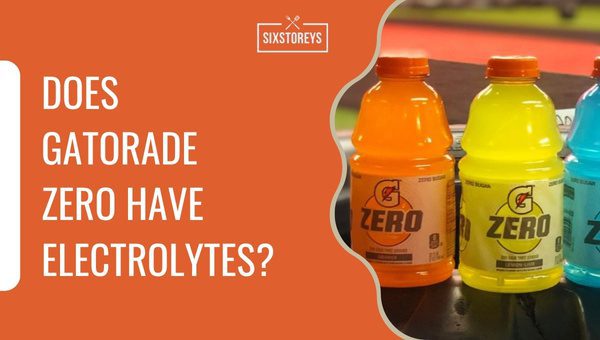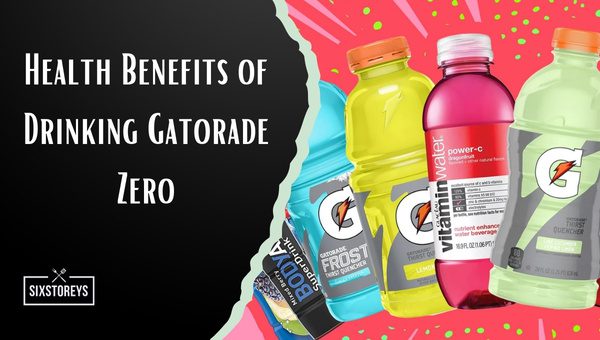Does Gatorade Zero Have Electrolytes? Myth or Reality?
Here we go, hydration is essential. That goes without saying, right? Yet, when we're on the go, hitting the gym, or perhaps grinding through that midday slump, we need a little more than just water. Enter sports drinks, our trusty energy-restoring companions. And at the top of the list? Gatorade, of course! But hold up; have you heard about the new kid on the block? Yes, you guessed it; I'm talking about Gatorade Zero! So, the question is, does Gatorade Zero have electrolytes? Well, let's dive in and explore this zero-sugar variant of our all-time favorite sports drink. Here's your sip-by-sip guide to everything you need to know!
Also Read: Best Blue Gatorade Flavors
Article Includes
Does Gatorade Zero Have Electrolytes?

Yes, Gatorade Zero definitely does have electrolytes. In fact, it contains two key electrolytes vital for our bodies: sodium and potassium. The purpose of these electrolytes is to help your body efficiently hydrate and replenish lost salts after those sweat-inducing workout sessions.
Sodium in Gatorade Zero
It's essential to note that sodium helps regulate water balance in your body. That's especially important after an intense workout, when you're likely to sweat a lot and lose vital salts. Gatorade Zero contains about 270mg of sodium per serving, offering a replenishing boost for those of you pushing the boundaries with your workouts.
Potassium in Gatorade Zero
In addition to sodium, Gatorade Zero also brings in the added benefit of potassium. This wonder electrolyte is in charge of supporting heart function and muscle contractions – both indispensable during a workout. A serving of Gatorade Zero will enrich your body with 75mg of potassium, helping your muscles recover and preparing you for the next round of physical exertion.
The Electrolyte Balance
While you might wonder if Gatorade Zero, being a zero-sugar and low-calorie drink, would skimp on the electrolyte balance - that's not the case. The electrolyte levels in Gatorade Zero are very similar to those in the original Gatorade. This makes it a good choice for those who want to cut sugar but still need that post-workout salt replenishment.
A Closer Look: The Nutrition breakdown of Gatorade Zero
Arguably, the main selling point of Gatorade Zero is its lack of sugar. Yes, you heard it right - zero grams of sugar! But don't let that fool you into thinking it's devoid of essential nutrients. You see, like its sugary counterparts, Gatorade Zero is fortified with an array of replenishing electrolytes.
Here's a quick rundown of Gatorade Zero's nutrition facts per serving (591ml):
- Calories: 0
- Sodium: 270mg
- Potassium: 75mg
- Carbohydrates: Less than 1g
- Protein: 0g
- Vitamins: No significant amounts
Note that the primary electrolytes in Gatorade Zero are sodium and potassium. Sodium aids in maintaining fluid balance, while potassium prevents muscle cramps during those intense workout sessions.
Health Benefits of Drinking Gatorade Zero

Drinking Gatorade Zero can indeed have benefits, especially in the context of physical exertion. Essentially, it all boils down to the electrolytes it delivers. But what exactly are these benefits, you ask? Let's break it down for you.
Hydration
The electrolyte blend in Gatorade Zero effectively aids in maintaining hydration, especially during prolonged physical activity. When you sweat, you don't just lose water but also significant amounts of sodium and potassium, which can lead to dehydration if not timely replenished.
Post-Exercise Recovery
Following an intense workout, you may feel drained and dehydrated. That's where Gatorade Zero comes into play. The sizable electrolyte concentration can help replenish what's lost in sweat. This can certainly aid in quicker overall recovery, getting you back in your fitness game faster!
Sugar Control
With zero grams of sugar, Gatorade Zero can be an excellent option for those watching their sugar intake. Whether you're counting calories for weight loss, or managing blood sugar levels due to diabetes, this zero-sugar sports drink could meet your needs without sacrificing those crucial electrolytes.
Gatorade Zero doesn't just quench your thirst but also restores critical electrolytes your body might have lost during physical activities, offering health benefits that could work wonders for your post-workout recovery and overall well-being. Plus, with no sugar in the mix, you can enjoy these benefits with zero guilt!
Choosing Gatorade Zero: Good or Bad?
When it comes to refreshing your body after a vigorous workout, does Gatorade Zero make the cut? Is it the right choice for your hydration needs? Let's look into the pros and cons to make an informed decision.
Pros of Gatorade Zero
- Calorie Count: Intrinsically, the best part about Gatorade Zero is its calorie count or, shall I say, lack thereof. If you are watching your weight or trying to cut back on sugar, Gatorade Zero, with its no-calorie merit, might be an enticing option.
- Electrolyte Restoration: This is probably why you prefer sports drinks to pure water, right? Despite being sugar-free, Gatorade Zero does pack a potent punch of essential electrolytes, albeit in a bit smaller quantities compared to the regular Gatorade.
- Variety of Flavors: Just because it's zero sugar doesn’t mean it's zero fun. Gatorade Zero provides a range of delicious flavors, offering as much variety as the original product.
Cons of Gatorade Zero
- Artificial Sweeteners: To compensate for the lack of sugar, Gatorade Zero uses artificial sweeteners, particularly sucralose and acesulfame potassium. Although approved by the FDA, some individuals might have specific health concerns or personal preferences against these sweeteners.
- Lesser Electrolytes: Yes, Gatorade Zero has electrolytes, but in lesser quantities than its sugar-packed counterpart. Although this may not matter much to the casual gym-goer, competitive athletes might need the higher electrolyte content found in regular Gatorade.
- Less Hydrating: Surprising, right? Well, sugar in regular Gatorade plays a significant role in slowing the fluid absorption rate, allowing better hydration. With zero sugar, Gatorade Zero gets absorbed quicker, which could potentially make you feel dehydrated faster.
Also Read: Best Gatorade Flavors Ranked
Frequently Asked Questions
How many electrolytes are in Gatorade Zero?
There are 270 milligrams of sodium and 75 milligrams of potassium per 20-ounce serving of Gatorade Zero.
Is Gatorade Zero as effective as regular Gatorade?
Both drinks provide hydration and replenish electrolytes, but they differ in calorie and sugar content. Gatorade Zero may be more appropriate for those looking to limit their sugar intake.
Can I drink Gatorade Zero every day?
While it contains less sugar, drinking any sports drink every day isn't recommended unless you engage in high-intensity or long-duration workouts regularly.
Is Gatorade Zero good for dehydration?
Yes, Gatorade Zero can help replace electrolytes lost through sweat, aiding in hydration.
Does Gatorade Zero help recovery?
As it contains electrolytes that help maintain fluid balance, Gatorade Zero can assist in post-workout recovery.
What’s the biggest difference between Gatorade Zero and regular Gatorade?
The biggest difference lies in their sugar content. Gatorade Zero doesn't have any sugars, while regular Gatorade contains 34g of sugars per 20-ounce serving.
Is Gatorade Zero suitable for a low-carb diet?
Yes, since Gatorade Zero has no carbs or sugars, it can fit into a low-carb diet plan.
Is Gatorade Zero keto-friendly?
Yes, Gatorade Zero is generally considered keto-friendly as it contains zero sugars and is low in carbohydrates.
Conclusion
After thoroughly looking into Gatorade Zero and considering all the facts, it's clear that this drink does indeed pack a punch with its electrolyte content. Despite its absence of sugar and calories, it delivers on its key promises - hydration and recovery. Yet, like with anything we ingest, moderation is key. Gatorade Zero is an excellent option for those intensive workout days, but it doesn't replace pure water and a balanced diet for good health and wellbeing.
We all have unique nutritional needs, hence, choosing what to drink should be a personalized decision. Keep experimenting, consult your healthcare provider if needed, and find what works best for you. Remember, staying fit, healthy, and hydrated is the ultimate goal!

